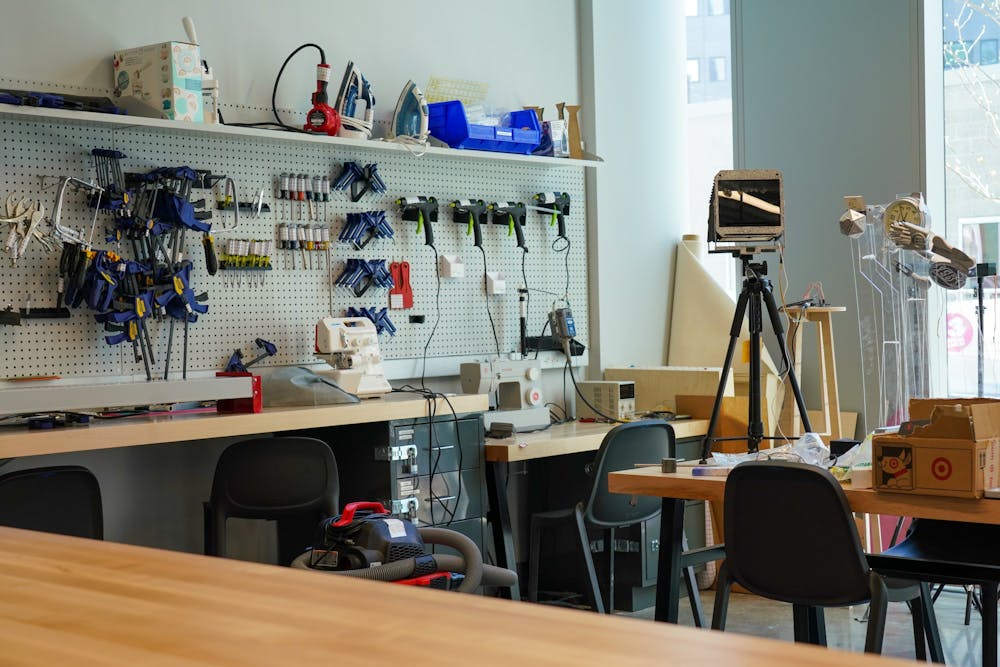Enter any intro–level Wharton entrepreneurship class, and you’re drilled with the legend of Warby Parker. In 2010, four Wharton MBA students were awarded $2,500 from the Venture Initiation Program at Wharton Entrepreneurship—they then founded an eyewear startup that eventually grew into a market–altering powerhouse now valued at $6 billion. Since then, the story of Warby Parker has been passed down through generations of Whartonites, told and retold within the startup community. From all over the world, Elon Musk wannabes flood to the Wharton School to pursue the prospect of replicating this dream themselves.
However, this is not the story Taylor Durham, director of marketing at Venture Lab, hopes to reinforce to the rest of the University community. Along with a team of five undergraduates, Durham seeks to reposition Venture Lab—the new home base of Penn’s entrepreneurial resources—as a more inclusive and uniting force, open to all of Penn.
In July 2020, Venture Lab rebranded from Penn Wharton Entrepreneurship to its current name. The organization is located at the intersection between 40th and Sansom streets, in a square, light blue building called Tangen Hall. With windowed walls facing the sides of the road, Tangen Hall has its arms wide open to the local community. The building is transparent for any passersby who may cast a curious look inside.
If you feel adventurous enough to push through the front doors, you'll discover a world inside that challenges the limits of imagination. The centerpiece of the welcoming lobby, a futuristic wave–shaped woodcut bench, is most indicative of Venture Lab’s character. This furniture piece is put together by students across the engineering, design, and business sectors with hollowed–out spaces between the woodcut boards. Once you learn about its purpose, it's hard to take your eyes off of its presence. Innovative, inventive, and integrative, this is what Venture Lab is all about.
Combining the brainpower at Weiss Tech House from Penn Engineering, marrying innovations from the Weitzman School of Design with Wharton, Venture Lab wants to be the new one–stop shop for entrepreneurship enthusiasts in the Penn startup ecosystem, helping to provide easier access to diverse resources the University has to offer. The organization accommodates the needs of any startup by incorporating exciting new features into the building: a test kitchen for burgeoning food startups, a fabrication studio with 3D printers and laser cutters, and a digital design studio storing high–level photography production technologies. Venture Lab provides a young entrepreneur or innovator with everything they could wish for—except for one thing: Throughout this seven–story building, not one undergraduate or graduate school’s branding is on display.

“You don’t see Wharton branding anywhere, you don't see Engineering branding, you just see Venture Lab at the University of Pennsylvania. … That's the goal. That's what it should be,” says Durham.
Entrepreneurship at Penn has a long history going all the way back to 1973, when Wharton launched its first entrepreneurial center to focus on venture capital financing. But for decades, resources remained limited to one school. Fostering inclusion and integration of resources within the University was not brought to the table until Karl Ulrich took over as vice dean of entrepreneurship & innovation in 2015.
“Karl sat at the intersection of engineering, product design, and then Wharton,” says Trang Pham, the executive director of Venture Lab. Ulrich is a Wharton professor who's passionate about interdisciplinary collaborations. He personally spearheaded the shift from Wharton entrepreneurship to Penn Wharton entrepreneurship, and eventually to Venture Lab. “That shift was when we really embraced other students who were not from Wharton,” says Pham. She recalls the ripples of change that began the transformation of integrating University–wide resources for innovation.
Pham explains that the idea of Venture Lab came out of a discussion between Ulrich and the then–Wharton Dean Geoffrey Garrett at the beginning of Ulrich’s tenure. Initially, Ulrich had proposed an entirely new school, like an innovation college, pioneering the integration of different disciplines in higher education. However, after bouncing his ideas off of Garrett, they eventually decided to start small, proposing a building that could serve as a mini innovation space for the University community.

Venture Lab is a vision for bridging resources across Penn undergraduate and graduate schools. “In time, what I would like to see is for anybody that's interested in entrepreneurship at the University … Venture Lab is step one,” says Durham. “Then, from Venture Lab, all roads fan out to everything else at the University, which is what the ideal would be.”
But there's a distance between the ideal and the reality, separated by “those nuances within a culture at Penn, Wharton versus non–Wharton.” Prior to the transition to Venture Lab, Durham conducted extensive research to map out strategic marketing decisions that would engage a broader audience from the Penn community. His research showed that decentralization was at the core of the culture that's holding back innovation and collaboration on a larger scale.
Durham discovered that students tend to feel more comfortable using resources from their home schools, the individual schools to which Penn students were admitted. For instance, a student from the College of Arts and Sciences may be deterred from using resources from an organization labeled under Wharton or the Engineering School. Durham’s research found two prominent reasons for this observed trend: (1) Students feel that resources outside of their home school don’t belong to them; and (2) even if they did, they believed that they would be disfavored from being awarded those resources.
Despite Penn’s goal of becoming “one university,” students from different schools are separated by building and resource restrictions, especially in the case of the business school. One of the first things an incoming undergraduate may learn about campus life is that the nicely furnished group study rooms in Huntsman Hall can only be booked with a Wharton email address. The 324,000–square–foot Huntsman Hall hosts 57 group study rooms, while the rest of the University shares ten group study rooms on the ground floor of Van Pelt Library, the only other space offering 24–hour student study rooms. Given Penn’s notoriously competitive culture, it’s no wonder that students feel discouraged from reaching out for resources under a school’s name with which they are not affiliated.

The new goal of Venture Lab is to reach more audiences at Penn and rally the entire community. To achieve that, Pham realized the importance of changing the name from Penn Wharton Entrepreneurship to something more inclusive. “All our students and alums from other schools embraced it more when the name was Venture Lab, versus when we put a qualifier in front,” says Pham.
Compared to Wharton students, whom Pham believes to be more indifferent to a name change, the students from other schools feel much more comfortable with an organization without a specific school branding. Durham was also a strong proponent of the rebrand. “In order for entrepreneurship to be truly effective, there needs to be some kind of bridge between the schools within the University that actually have that strong foothold,” says Durham.
This is what Venture Lab aspires to be.
Venture Lab meets students where they are, targeting startups at all levels. From startups that have validated the market to business ideas yet to be developed into a brand, Venture Lab welcomes them all. Durham describes that, ideally, people come into Venture Lab’s multistory building with a rough vision of what they want to do, visit the studios on the different floors, then workshop their ideas. And by the end of their visit, they could potentially have a minimum viable product (MVP) to test on the market.
Venture Lab also has myriad program offerings for Penn students interested in exploring entrepreneurship. The community’s Venture Initiation Program (VIP) branches out to four different offerings: Penn’s own incubator which helps to grow early–stage startups, a three–month accelerator program that targets more developed startups and provides mentoring resources, a San Francisco–based accelerator program, and the Fellows program dedicated to creating internship opportunities for students seeking experience in early–stage startups.
The organization also devotes the Startup Internship Award, Summer Venture Award, and Penn Wharton Innovation Fund to providing the financial assistance required to test out a student’s venture idea. Perhaps one of the most well–known events hosted by Venture Lab is its annual Startup Challenge, where students compete for a share in the over $150,000 cash award for winners.

“One of the beautiful things about Venture Lab, that I feel like a lot of students don't know, is that we give you funding, but we do not take equity or stock or IP,” Durham says.
Venture Lab’s goal isn’t to profit off of student ideas, but rather to give them resources to realize their visions—and even fail.
“If you fail, that's okay,” says Durham. “We are a cocurricular center, but we're also an Academic Resource Center. So the whole purpose of this is to supplement what [students] are doing at the University.”
Durham believes that encouraging trial and error is the key to engaging more members of the Penn community. He's quick to point out the unspoken truth: This industry champions a homogenous type of success story.
“Here's a bunch of guys that look the same, went through Wharton, got their MBA, started a company, now they're billionaires,” Durham says. “The nuances that aren't discussed—those are things that we have a really honest job to demystify.” Success stories—like that of Warby Parker—often gloss over the innate privileges that got the most notorious startup moguls to the top.
Entrepreneurship is intrinsically tied to the equal–opportunity promise of the American Dream. But that’s not the reality. A 2017 Harvard Business School study revealed that, across the 1990–2016 period, less than one percent of founders self–identified as African American and less than ten percent of the entrepreneurial and venture capital labor pool were women. The lack of representation and the high price of failure bar entrepreneurial hopefuls who hail from less privileged backgrounds from entering this field. “When you see the same face over and over again in a field you want to get into, you do start to question whether or not this field is for you,” says Durham.
From his observations and personal experiences, students from disadvantaged backgrounds are less likely to explore entrepreneurship because they don't have access to the privilege of family financial support to feel comfortable embracing the consequences of failure. “Anything that's not on the narrow path of you getting out of here with a degree is a risk,” Durham explains.
Venture Lab wants to challenge that mindset. “College is supposed to be your really safe space where you're supposed to be able to try and fail, and try and fail. And what is entrepreneurship but not trying and failing and trying and failing to succeed?” he says. Durham wants to dig out the topics less addressed in the industry and market with an inclusive lens to encourage more students to explore entrepreneurship. He believes this to be crucial for leveling the industry playing field.

One of the ways the Venture Lab marketing team furthers this mission is through conducting founder interviews. These videos filmed in Tangen Hall are then sent back to the founders as materials for media use, while also being uploaded to a cloud database. Durham hopes that, as Venture Lab grows into a more established brand, they can eventually look back on these videos as reference of where they were in the past to where they're at now.
He recalls a memorable conversation with a Venture Lab alumni founder who worked on a medical device startup. “You’re a Black woman who’s trying to do a medical device in a white male–dominated space. How are you navigating it?” he asked. “Because there is a lot probably expected of you.”
These questions led to an open, enlightening conversation. “There’s almost a breath of fresh air after it because I feel like nobody expects universities or higher ed to be so candid.”
Durham credits his team of undergraduate students as integral to the digital content production process. The Venture Lab marketing team consists of five undergraduate students: Gerardo Ballesteros (W ‘23), Bettina Catoto (W ‘25), Annabel Sumardi (C ‘25), Suzanna Wang (W ‘25), and Amy Zhou (W ‘25).
The marketing team hails from diverse backgrounds, and this is what Durham is especially proud of. He hopes to eventually grow a majority student–led, self–sustaining marketing team network at Venture Lab that both represents and highlights the diversity in the innovation space. “It's just as important to have those people on screen telling your stories, as much as it is to have those same people behind the camera recording them.”
Durham shares that Venture Lab is a majority women–led organization, and cultural diversity is reflected throughout the organization. “We need [our team] to mirror what the student population looks like. And it's starting to do so.”
With the exception of Gerardo, all of them are Penn first years. This is a deliberate choice by Durham, who values growth and passion for marketing.
“I choose undergraduate students for a reason,” says Durham. “Undergraduate students feel more involved in what they take on, they feel more committed to the cause.” He relies on his team to understand the Penn undergraduate audience.
“The public perception of what's out here is what we have to change,” he says. Durham wants to put out content on startup successes that's different from the usual narrative, content on entrepreneurial stories from students of diverse cultural backgrounds and fields of study.
In this way, Durham hopes that more students will see themselves exploring this space that's traditionally highlighted white, male success. He firmly believes that entrepreneurship belongs to all.

“There’s raw talent here. So the best way to cultivate raw talent is to let … [them] stick their hands in everything until they find what they want to do,” says Durham. From providing DSLR and 3D cameras and video production technologies, to funding trips to marketing conferences, to coaching digital editing techniques, Durham grows his team with time and care.
“We have a ton of tools on our hands that we would not have otherwise,” says Annabel. She explores her longtime passion for photography and design in her role as a design and communications specialist. Annabel views her time at Venture Lab as a growth journey—from nervous first product shoots to now being credited as a professional photographer on official websites.
Amy, who aspires to be a startup founder herself, also finds Venture Lab to be her natural home. She manages the social media accounts while assisting in strategic marketing campaign advice for startups. “Being a [first year] is actually a really special identity at Venture Lab,” says Amy. “It’s like I’m growing together with this new organization. We’re both starting from fresh.”
Amy intends to stay at Venture Lab marketing for all four years at Penn, and she’s not alone. Many of the student members have expressed a desire to work over the summer to help consult startups and plan projects for the upcoming semester, something Durham claims he's never seen before.
Annabel, who serves as the photographer of the team, provides one rationale for why the work is so compelling: During her time taking photos for startup teams and founders, she was struck by the diversity she was seeing at Venture Lab. “Every single team I’ve worked with is so diverse. My photos end up looking like stock photos, almost like we staged it,” says Annabel. “We already have the diversity and inclusion, and I’m just here to show that.”
Durham doesn’t want another Warby Parker story for the Venture Lab homepage. He wants to track down the stories that were untold, the ones that were left behind in someone’s Dropbox. To Durham, Venture Lab’s transformation to its new identity begins with the face it shows to the rest of the Penn community. It's about seeing diversity differently and finding ways to communicate Venture Lab’s new values: innovation, integration, and inclusion.

Eventually, Durham hopes that Venture Lab will become a brand of its own. An organization, a community—that's the reason behind why diverse student entrepreneurs from all over the world choose Penn.
“Doesn't matter what your educational background is, what your ethnic background is, whatever the standing is, Venture Lab is here to open up and take everybody in,” says Durham.
